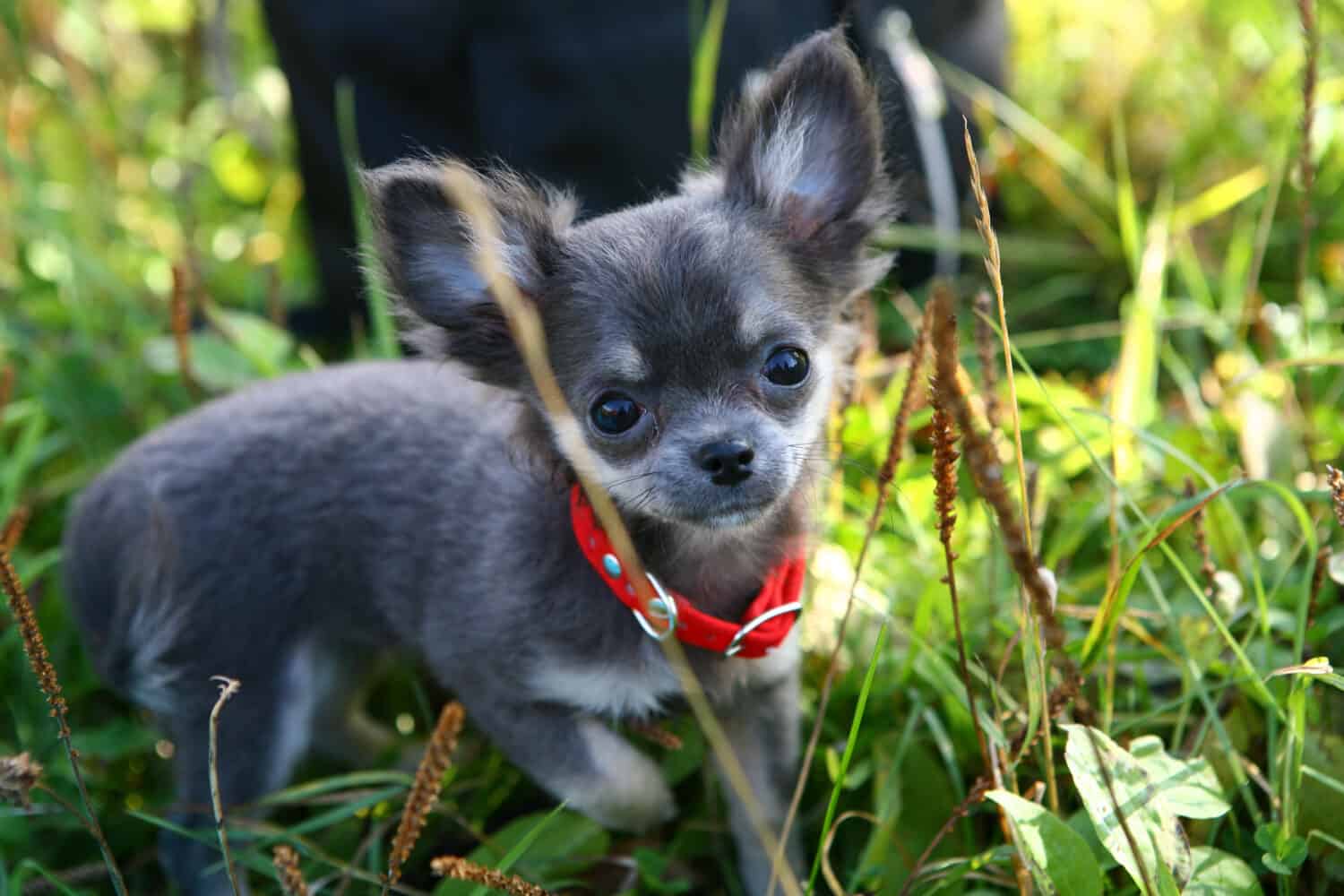Chihuahuas are most popularly known as the smallest dog in the world. As you might imagine, Chihuahua puppies are exceptionally small, weighing only a few ounces when they are born. Many people love these dogs because they are so small, though this can also cause a range of health issues when they become too small.
That said, these dogs can make a great addition to many families if you know what you’re getting into.
In this guide, we’ll tell you everything you need to know about these adorable dogs, including essential things to remember when caring for Chihuahua puppies.
History and Origin
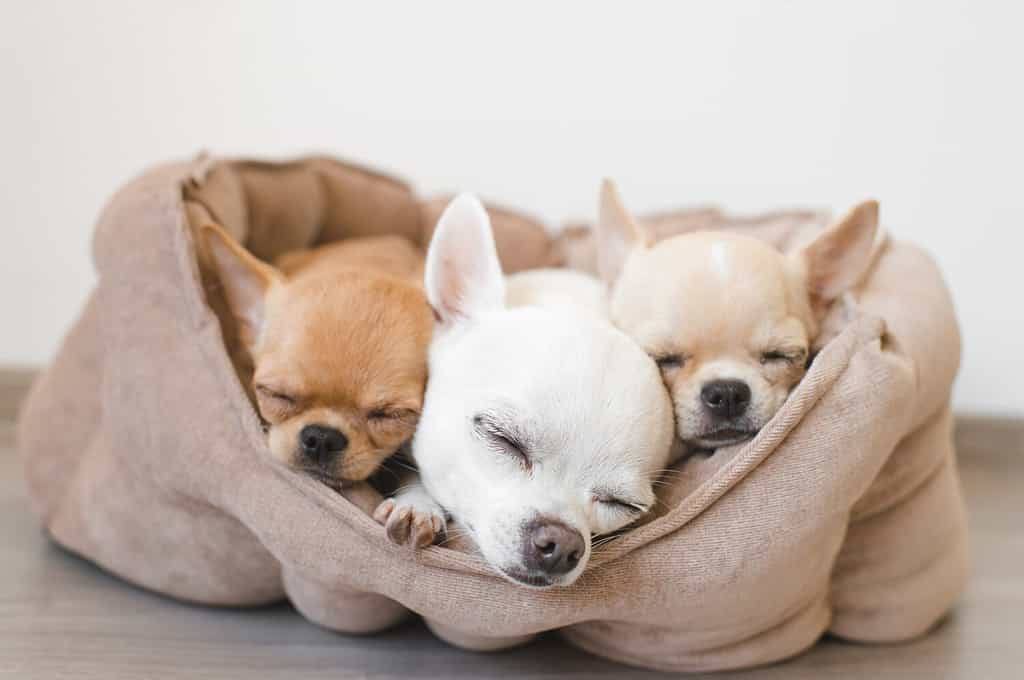
Because these dogs are so small, they grow rather quickly. Puppies can begin approaching the size of an adult after only a few months.
©Benevolente82/Shutterstock.com
Chihuahuas may be small in size, but they have an exceptionally rich history. They developed hundreds of years ago and are believed to be the descendants of Techichi, a small companion dog that was cherished in Mexico. These dogs were kept as pets, and they also carried cultural and religious significance.
The Techichi were often kept as companions to the Aztec royalty, as it was believed that they had mystical powers. They were thought to guide the soul to the afterlife. Therefore, they were often sacrificed upon the death of their owner. Chihuahuas are very likely to be descended from this breed, as they have many similarities.
However, the Techichi is considered an extinct breed today. The Chihuahua that we know developed in the 19th century, and they were first discovered by American tourists in the late 19th century. From that point, they were developed into a set breed named after the Mexican state of Chihuahua.
Characteristics and Appearance
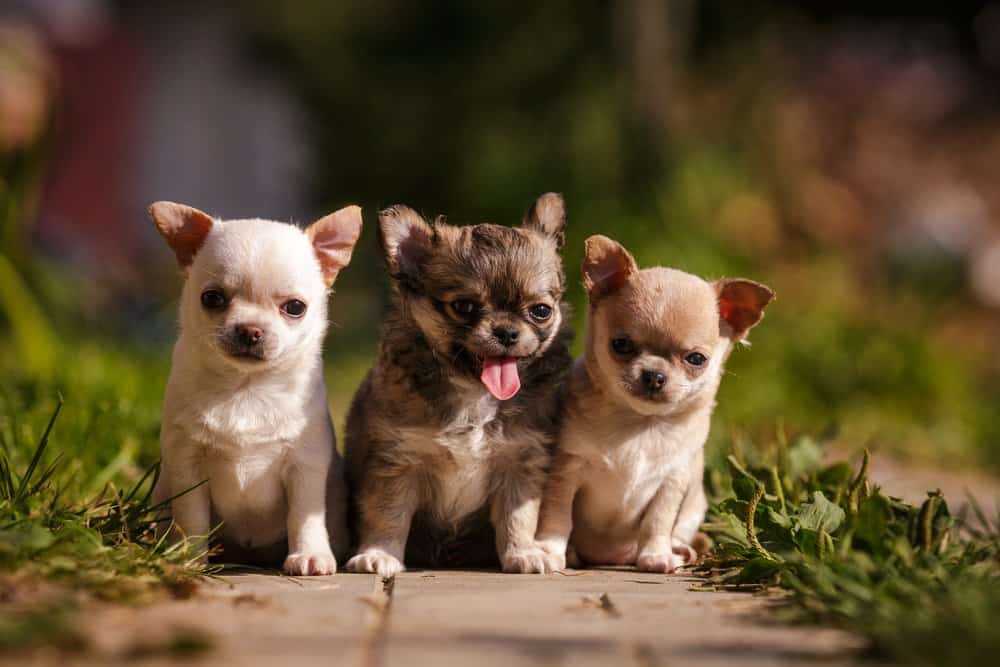
Chihuahua puppies are extremely small! This makes them very cute. However, it can also mean that they’re more prone to injury.
©Natalia Fedosova/Shutterstock.com
The first thing you’ll notice about Chihuahua puppies is their very small size. An adult Chihuahua weighs between 2 to 6 pounds, so you can imagine how small a Chihuahua puppy is. These dogs do reach their full size rather quickly, though, as they don’t have much weight to gain.
Their petite size is why many people like them. They’re ideal for smaller spaces and those looking for a lapdog.
Chihuahuas have very large, expressive eyes. They’re typically darker in color, but more colorful eyes are often sought after. They have exceptionally pointy ears that may look a bit too large for their body, adding to their adorable expression.
Chihuahuas often have a distinctive “apple head” shape. This means their heads are round and domed, and they typically have a short, slightly tapered muzzle. The apple head is considered a breed standard, and Chihuahuas with this feature are highly sought after.
Chihuahuas come in many different coat types and colors, as well. Their coat can be either short or long, though short is the most common. They come in colors ranging from fawn to cream to black to tan. They may even be chocolate or “blue.” With so many color variations, Chihuahuas can look exceptionally unique.
As you might guess, these dogs have an exceptionally compact body. Their thin legs support their small, elegant frame. While they are so small, they are pretty well-proportioned.
Temperament
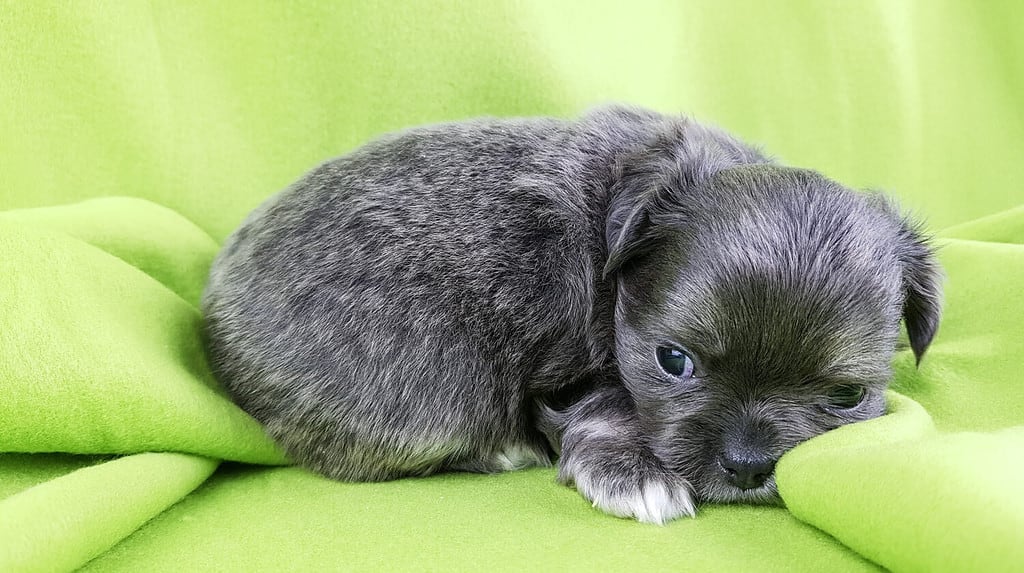
Theses dogs can come in many different colors. However, some of them are rarer, like this silver coat color.
©Natalivideo/Shutterstock.com
Chihuahua puppies may be small in size, but they have very large personalities. They’re often very people-driven and eager to please. While they aren’t necessarily the most intelligent dogs, they can be trained with patience. They’re very alert, so they can make excellent watchdogs. In many cases, they alarm at the slightest noise.
Often, these puppies bond quickly with their human family members. They’re very loyal, which can lead to some possessiveness if they aren’t carefully socialized. They may also be one-person dogs, which means they may bond particularly closely with one member of their family.
While these dogs are small, they have lots of energy and can be very playful. Their youthful energy lasts well into adulthood, so they’re great for those who want an active little dog. Despite what many think, they often aren’t happy to lounge around in laps for much of the day.
Chihuahua puppies are also very fearless. They won’t back down from a challenge and are quick to defend their loved ones. Their assertiveness can lead to lots of feistiness.
They may get “small dog syndrome,” which occurs when smaller dogs aren’t properly socialized. They become fearful of their surroundings and feel the need to assert themselves, often by presenting territorial behaviors and aggressiveness. Proper socialization is vital to prevent this, especially with other dogs and children.
Because Chihuahuas are primarily companion dogs, they are very in tune with their owner’s emotions. They tend to be very people-focused and can respond quickly to subtle cues they notice from their human companions.
It’s important to note that these dogs are very vocal. While they are small, they tend to bark and vocalize a lot. Therefore, they may not be best in apartments, despite the fact that they’re often advertised as being great for smaller spaces.
Care and Maintenance
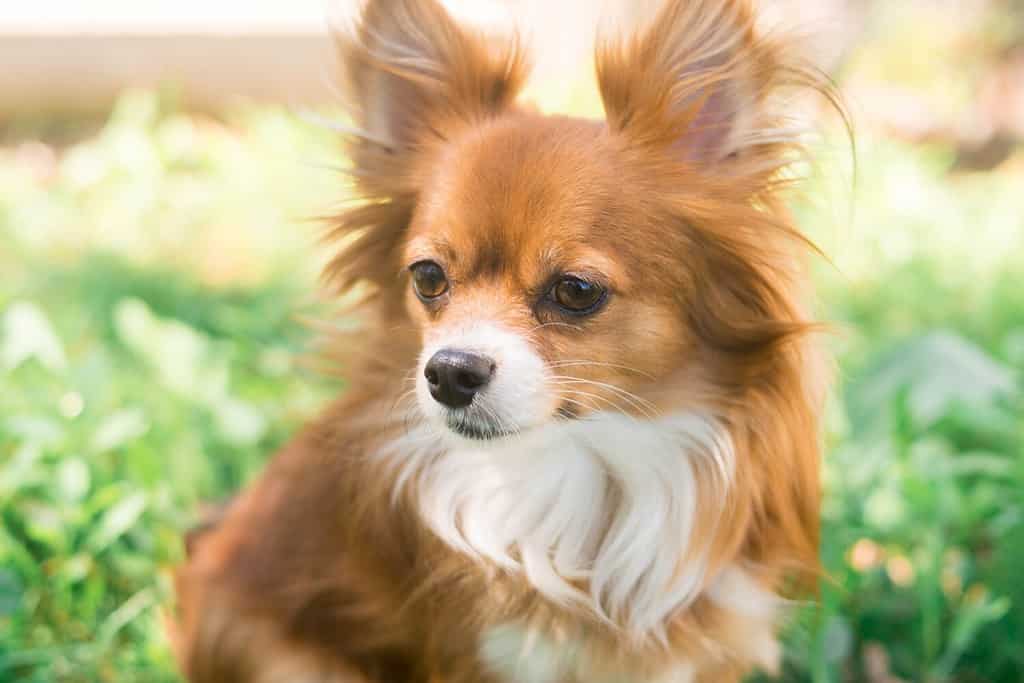
Long-haired Chihuahuas need much more grooming, as they are prone to tangles. However, they don’t typically need professional haircuts like other long-haired breeds.
©Lisa Chip/Shutterstock.com
Caring for Chihuahua puppies can be more challenging than other dogs. Because they are so small, they have some issues if they aren’t taken care of properly. Chihuahua puppies need a balanced diet to support their growth and energy levels. They also need to be fed several times a day. Because they are so small, their blood sugar can drop very quickly.
Therefore, it’s essential to feed them at least six times a day. This frequency can drop as they become older.
You should also avoid overfeeding them. They can easily become obese due to their small size. Even a pound can be a huge weight gain for these small dogs.
Grooming your puppy will depend on their coat type. Short-haired Chihuahuas don’t have many maintenance needs, but long-haired dogs do need regular brushing to prevent matting and tangling.
You’ll only need to give these dogs occasional baths. Overbathing can strip their skin of natural oils, causing skin issues and dryness. Use a gentle dog shampoo whenever these dogs do get dirty enough to need a bath, and be sure to dry them thoroughly.
These dogs must have their teeth brushed and cared for, as they are prone to dental issues. You’ll likely need to get your dog regular dental cleanings at your vet’s office, too.
Chihuahua puppies need energetic and regular exercise. Luckily, they are small, so getting them the exercise they need is pretty straightforward. You can even do it indoors if you are so inclined.
Mental stimulation is also important. You may want to provide interactive toys to keep your dog entertained when you are not home. However, because Chihuahua puppies are so small, it can be challenging to find toys that fit. You may have to DIY some options.
Health Considerations
You need to schedule your Chihuahua for regular check-ups with your vet. Because these puppies are so small, they tend to be more prone to complications due to illnesses. Therefore, vaccinations, deworming, and other preventative care are absolutely necessary.
These dogs are also prone to a few health problems, even as puppies. These include dental problems, patellar luxation, and tracheal collapse. We highly recommend educating yourself on these health issues and keeping an eye out for them. While none of them are particularly deadly, they can lead to complications if not treated promptly.
Chihuahuas are sensitive to extreme temperatures. Protect them from cold weather with appropriate clothing, and avoid exposing them to excessive heat. The smaller the dog, the more prone they are to these problems.
Because these dogs often have complicated pregnancies, it’s even more important to discuss an appropriate time for spaying and neutering them with your vet. In most cases, you’ll want to spay or neuter them before they reach sexual maturity to prevent unwanted litters.
Training and Socialization
Because these dogs are so small, it isn’t odd for pet owners to believe they can skip training and socialization. After all, they’re pretty easy to handle, thanks to their smaller size. However, Chihuahua puppies do need training, just like any other breed.
Use positive reinforcement methods to encourage good behavior. Treats, praise, and rewards encourage good behavior. Avoid harsh punishments, as these can lead to fear and anxiety for your puppy, potentially making their behavior worse.
It’s very important to be as consistent as possible. Clear rules and boundaries should be established from day one, and all family members should be on the same page. Housebreaking these dogs take a very long time, as their bladders are very little. They need to go outside very often, which can make them hard to potty train.
Basic obedience commands like sit, stay, and come should be taught as soon as your dog comes home. We highly recommend enrolling your puppy in obedience classes, as these can provide training and socialization.
Speaking of socialization, it’s vital that your puppy is exposed to many different people, animals, and environments from a very young age. Ensure that your dog has positive experiences with other dogs and people to prevent aggression and fearfulness.
Gradually expose your Chihuahua to different stimuli, including loud noises and car rides. These experiences help desensitize your Chihuahua to different environments and situations.
Do Chihuahua Puppies Make Good Family Pets?
Chihuahua puppies can make great family pets if they are properly cared for and trained. They can be great with children, especially when raised for them. However, Chihuahua puppies are extremely small and delicate. Therefore, they can easily be injured through rough play or accidental mishandling.
It’s very important to teach your children how to handle puppies properly to avoid injuring them. Teaching your children to respect your dog’s space is important. It’s important to avoid sudden movements and loud noises, as these can startle your Chihuahua.
Early socialization with children is important for your pet. Positive experiences with kids are important to ensure your dog will enjoy being around children.
Chihuahuas usually get along with other pets. However, it’s important to introduce them to other pets at a relatively young age. Socialization is important, as these dogs may be startled otherwise.
All family members should participate in the training and socialization of the dog, including children. Consistency in training is important, so everyone needs to be involved.
How Much Do Chihuahua Puppies Cost?
The cost of a Chihuahua varies widely, depending on the pedigree of the puppy and the breeder. On average, a Chihuahua costs between $800 to $2,500. Established breeders are typically the best option, as they produce healthy, well-socialized puppies. However, they do charge more, which is something to keep in mind.
Puppies from show-quality or champion bloodlines may command a higher price. Long-haired dogs are also more expensive, as they require more time commitment on the part of the breeder.
The cost of Chihuahua puppies can vary depending on your location and the local demand for the breed.
Puppies with complete veterinary records, vaccinations, and health guarantees are often a higher price. However, you may have to pay less in vet bills, which may actually decrease the overall price you pay.
Tips on Finding a Quality Chihuahua Breeder
A reputable Chihuahua breeder is essential if you want to adopt a well-cared-for puppy. However, finding these breeders can be more challenging than you might expect. Here are some tips to help you select a quality breeder:
- Breed Club Affiliate: Look for breeders who are members of the Chihuahua Club of America or other reputable breed clubs. Membership often indicates a commitment to the breed’s standards and ethical breeding practices.
- Health Testing: Reputable breeders will conduct health tests on their potential breeding dogs to prevent the passing of negative genes. Of course, this costs money, so these puppies will often be more expensive.
- Visit the Breeder: You should visit the breeder’s facility or home. You should look at the dog’s living conditions. If the breeder won’t allow you to see where the puppies and mother live, it’s a red flag.
- Documentation: Reputable breeders will provide lots of documentation with the puppies, including vaccination schedules, health records, and the puppy’s pedigree.
- Pedigree: While this isn’t as important as other options, it is vital to ask about your puppy’s pedigree. At the very least, this is proof that the puppy is purebred.
- Socialization: Ask about how the breeder socializes the puppy. Good breeders will provide plenty of socialization, even when the puppies are very little.
- Health Guarantee: Reputable breeders offer a health guarantee that covers specific health conditions for a certain period after purchase. This demonstrates their commitment to the well-being of the puppies they produce.
Growth and Milestones
Understanding your dog’s growth and developmental stages is important to provide them with appropriate care and guidance. Chihuahuas go through several key phases that are important to understand when caring for your dogs.
- Neonatal Stage (0-2 Weeks): During this initial stage of life, Chihuahua puppies are completely dependent on their mother. They are born completely blind and deaf, unable to regulate their body temperature. They don’t do much at this stage.
- Transitional Stage (2-4 Weeks): Around the end of the second week, these puppies will have their eyes and ears opening. They begin to become more aware of their surroundings. By the end of this stage, they should start to walk and may engage with their littermates.
- Socialization Stage (4-12 Weeks): This period is vital for socializing the puppy. As you’ll notice, your breeder will have the puppy for the first half of this stage, so you’ll need to purchase from a quality breeder to ensure this stage is taken advantage of.
- Juvenile Stage (3-6 Months): As your Chihuahua puppy progresses through the socialization stage, they’ll start to develop their personality and become more energetic. They may become more independent and test boundaries. Continue to reinforce positive behaviors and provide them with opportunities to learn and explore.
- Adolescent Stage (6-12 Months): During adolescence, Chihuahua puppies grow physically and emotionally. Often, dogs will experience serious temperament changes, and they may become more stubborn. However, consistency with training and boundaries is essential at this stage.
Ready to discover the top 10 cutest dog breeds in the entire world?
How about the fastest dogs, the largest dogs and those that are -- quite frankly -- just the kindest dogs on the planet? Each day, AZ Animals sends out lists just like this to our thousands of email subscribers. And the best part? It's FREE. Join today by entering your email below.
Thank you for reading! Have some feedback for us? Contact the AZ Animals editorial team.

